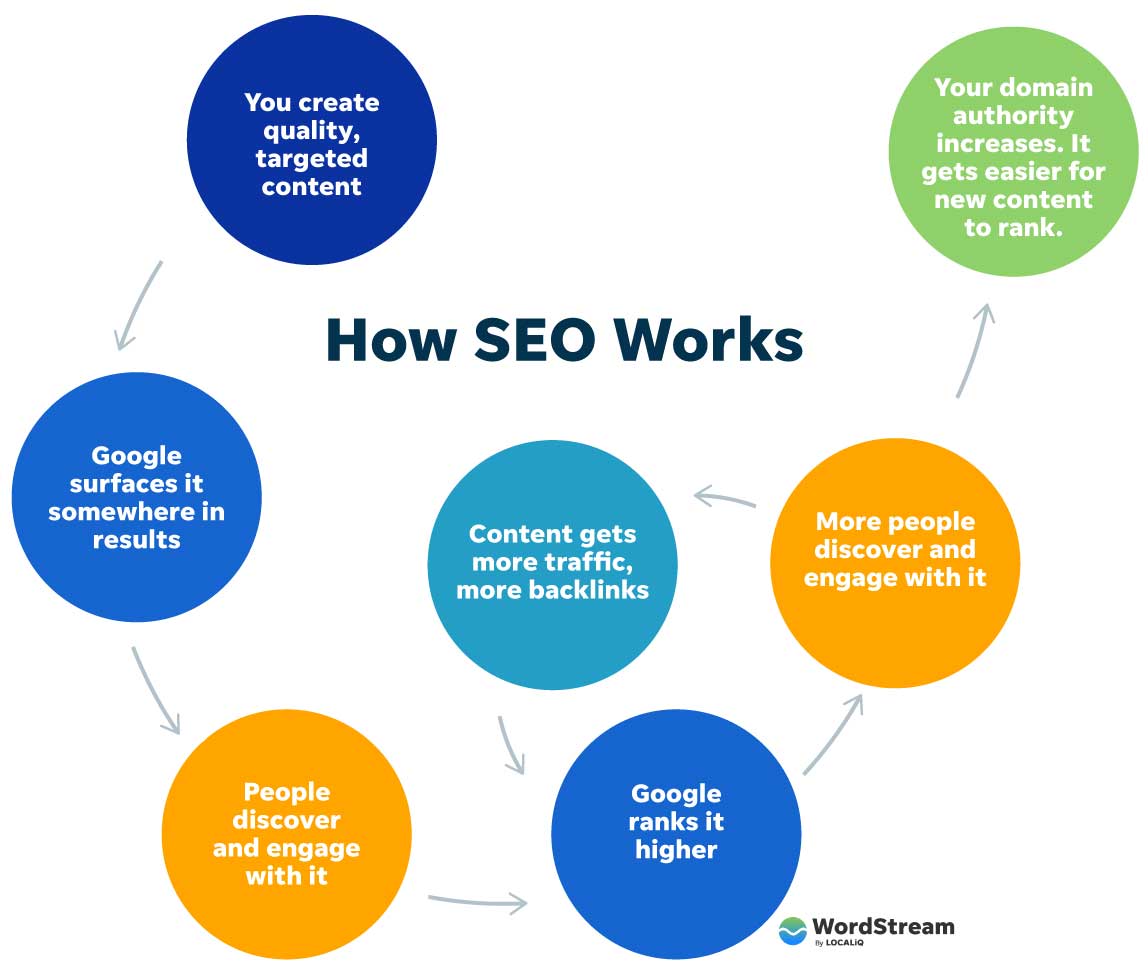How SEO Works in Digital Marketing: A Comprehensive Guide
Search Engine Optimization, commonly known as SEO, is a vital part of digital marketing that helps businesses increase their online visibility. With the right SEO strategies, businesses can attract more traffic to their website and improve their ranking on search engine result pages (SERPs). In this article, we will explain how SEO works and its importance in digital marketing.
1.What is SEO?
2.How SEO Works?
3.Why SEO is Important in Digital Marketing?
4.Types of SEO Techniques
- On-page SEO
- Off-page SEO
- Keyword Research
- Content Creation
- Website Optimization
- Link Building
7. How to Measure the Success of Your SEO Campaign?
8. Frequently Asked Questions (FAQs)
- What is the difference between organic and paid search results?
- How long does it take for SEO to work?
- Can SEO guarantee a top ranking on search engine results?
- Why is content important for SEO?
- What are some common SEO tools?
1-What is SEO?
SEO refers to the process of optimizing a website to improve its ranking on search engine result pages (SERPs). The primary goal of SEO is to attract more traffic to a website by increasing its visibility on search engines such as Google, Bing, and Yahoo. SEO involves various techniques such as keyword research, on-page optimization, off-page optimization, and link building.
2-How SEO Works?
Search engines use complex algorithms to determine the relevance and authority of a website. When a user enters a query in the search box, the search engine scans through its index to find the most relevant websites. The search engine then ranks these websites based on their relevance and authority.SEO works by optimizing a website's content, structure, and links to make it more relevant and authoritative. By using relevant keywords, creating high-quality content, and building high-quality links, businesses can improve their website's ranking on search engine result pages (SERPs).
4- Types of SEO Techniques
On-page SEO
On-page SEO involves optimizing a website's content, structure, and HTML code to make it more relevant and user-friendly. This includes optimizing the website's title tags, meta descriptions, header tags, and images. On-page SEO also involves optimizing the website's content for relevant keywords and creating high-quality content that provides value to users.
Off-page SEO
Off-page SEO involves optimizing a website's external factors such as backlinks and social signals. This includes building high-quality backlinks from relevant websites, promoting the website on social media platforms, and building a strong online reputation.
Keyword Research
Keyword research is the process of finding relevant keywords that users are searching for on search engines. Businesses should conduct thorough Website optimization, optimizing a website's structure and HTML code to make it more user-friendly and search engine-friendly. This includes optimizing the website's title tags, meta descriptions, header tags, and images.
Link building is the process of acquiring high-quality backlinks from relevant websites. Backlinks are an essential factor in SEO, as they signal to search engines that other websites consider your website to be authoritative and relevant. Businesses should focus on building high-quality backlinks from relevant websites to improve their website's ranking on search engine result pages (SERPs).
Common SEO Mistakes to Avoid
While SEO can be incredibly beneficial for businesses, there are some common mistakes that they should avoid. These include:
- Keyword stuffing: Overusing keywords in content or meta tags can result in penalties from search engines.
- Ignoring on-page SEO: Neglecting on-page optimization can lead to poor user experience and lower search engine rankings.
- Focusing on quantity over quality: Building low-quality backlinks can result in penalties from search engines.
- Neglecting mobile optimization: With more people using mobile devices to search the web, businesses need to ensure their website is mobile-friendly.
How to Measure the Success of Your SEO Campaign?
To measure the success of an SEO campaign, businesses should track the following metrics:
- Keyword ranking: Tracking keyword rankings can help businesses see how their website is performing on search engine result pages (SERPs).
- Organic traffic: Tracking organic traffic can help businesses see how many people are visiting their website from search engines.
- Bounce rate: Tracking bounce rate can help businesses see how many people are leaving their website after only viewing one page.
- Conversion rate: Tracking conversion rate can help businesses see how many people are taking desired actions on their website, such as filling out a form or making a purchase.
Frequently Asked Questions (FAQs)
1-What is the difference between organic and paid search results?
2-How long does it take for SEO to work?
3-Can SEO guarantee a top ranking on search engine results?
4-Why is content important for SEO?
5-What are some common SEO tools?
conclusion, SEO is a critical part of digital marketing that can help businesses improve their online visibility and attract more traffic to their website. By using the right SEO strategies, businesses can stay ahead of their competition and build their brand. However, it's important to follow best practices and avoid common mistakes to get the most out of SEO.

